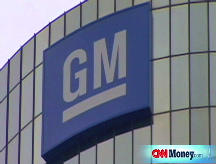GM shares plummet on downgrade
Credit Suisse downgrades General Motors' stock, saying the bailout will ravage the automaker's equity.
NEW YORK (CNNMoney.com) -- Shares of General Motors Corp. fell sharply Monday after an analyst at Credit Suisse downgraded the stock and cut its target price to just $1.
Credit Suisse analyst Christopher Ceraso said in a report that the terms of Friday's government bailout of the auto industry will weigh on GM, with bond holders, the United Auto Workers and company executives all working to reach a compromise agreement.
"It will become increasingly clear that the enormous sacrifice of value on the part of the union (upward of $10 billion) and bondholders (about $24 billion) will require the complete or near-complete elimination of the existing GM equity," said Ceraso in the report.
GM's (GM, Fortune 500) stock fell 21.6% Monday, to just $3.52 a share. The company's stock surged 22.7% on Friday after President Bush said the Treasury Department would loan $13.4 billion to GM and Chrysler LLC and take up to a 20% share of the companies.
As a result of the numerous changes GM is set to make to get emergency rescue funds, Credit Suisse downgraded its rating on the company to "underperform" from "neutral," and dropped the target price for GM shares to $1 from $2.
"In light of the complete overhaul of GM's capital structure that will likely be required to turn the company into a 'viable' entity and to comply with the government's requirements to receive the just-agreed-upon $13.4 billion in loans, we think existing equity holders will be largely (if not entirely) wiped out in the process," Ceraso said.
Ceraso also said the bailout money may not even save GM from filing for bankruptcy protection.
"If the bond holders and unions can not come to an agreement over the amount of value to be sacrificed, GM may still end up in bankruptcy court," he said.
The move follows a downgrade of GM's stock last week by Fitch Ratings.
A Standard and Poor's analyst also downgraded Chrysler Monday, citing a weak outlook for the company and an attempt to reduce its debt burden.
"Chrysler will offer to exchange some or all of its secured debt for equity or new debt at a steep discount to face value," said S&P analyst Robert Schulz in the note. "Given Chrysler's weak liquidity, we consider such an offer to be a distressed exchange and, as such, tantamount to a default." ![]()


